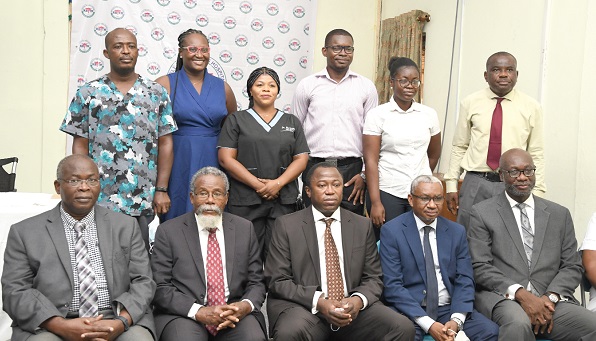
Korle Bu starts emergency medicine training programme
The Korle Bu Teaching Hospital has started an emergency medicine residency programme to train physicians on how to handle medical emergencies at the emergency rooms.
The programme, which is the first of its kind to be offered by the hospital, will see the physicians trained at the level of membership and fellowship.
Advertisement
The membership residents would undergo three years of emergency medicine training, while the fellowship residents would also have almost three years of training.
Hitherto, doctors of the hospital who so desired to specialise in emergency medicine had to travel to the Komfo Anokye Teaching Hospital, Kumasi, to receive such a training.
Cases received
At a programme held at the hospital to inaugurate the Emergency Medicine Residency training programme, the Chief Executive Officer of the Korle Bu Teaching Hospital, Dr Opoku Ware Ampomah, said it was unfortunate that although the hospital received an average of about 18,000 to 20,000 emergency cases every year and lots of referrals, it was worrying that till date, it did not have an emergency training programme.
He added that a lot of the ‘no-bed’ syndrome people associated hospital emergencies with had to do with the fact that the hospitals needed physicians who had high level of experience in emergencies to quickly diagnose what the problem was and sort outpatients into the relevant departments so that the emergency room could be free.
“The best emergency room is one that is empty because it means the staff are ready to receive the next case. If the staff come in and the decision making doesn’t go quickly so that the patient is sorted and moved out to enable new patients to be received, that is what creates that backlog,” he explained.
Emergency medicine training programme
He mentioned the benefits of the emergency medicine residency training programme to include the fact that it would help the hospital to have people with high level skills situated within the hospital’s emergency room to quickly sort out the problems of patients.
This, he explained, would help to decongest the emergency rooms so that they would be free to receive new patients and give them prompt treatment.
“The emergency area is one of the high impact, high stress environment you can encounter in any hospital. If somebody comes with a heart attack, that is not the time for a junior doctor to play around. We need people well versed in those issues to be able to deal with the cases as soon as they come, they take decisive actions which in many times will save lives. So to have the lowest cadre seeing cases in the emergency room is something that is untenable. We look forward to a time that once you hit the doorsteps of Korle Bu, whatever your issues are, the best of care will be provided for you.”
Inaugurating the training programme, the Rector of the Ghana College of Physicians and Surgeons, Prof. Richard Adanu, stressed the importance of emergency medicine explaining that what the hospitals needed was not different trainees and their emergency rooms, rather an emergency department where there were specialist emergency physicians on duty at all times to quickly attend to emergency cases as they come and when parents department were called, they moved in immediately so that there was space in the emergency centres.
He urged teaching hospitals to train more physicians to fill up the space that would be created with the more hospitals that were going to be put up by the government under its Agenda 111 programme.
The trainees
For his part, the President of the Ghana College of Physicians and Surgeons, Dr Nkrumah Mills, asked the trainees to attain great heights even with limited resources.
He said accidents in the country kept increasing and with Easter approaching, the death rate might increase and ,therefore, called for efforts to be put in place to prevent them.
In his brief remarks, the Director of Medical Affairs at the hospital, Dr Ali Samba, said they were starting the training programme with seven resident doctors — three were pursuing a membership residency programme, while the remaining four would do a fellowship residency training programme.




